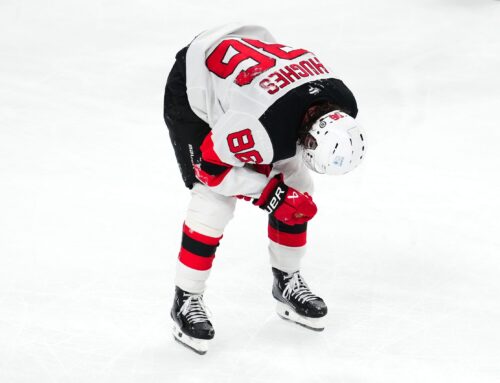The Devils have extended Erik Haula, signing him to a three-year contract worth $3.15 million per season. In his only season with New Jersey, Haula scored 42 points in 80 games, good for a 0.53 PTS/GP pace. That is within the range of the 0.4 to 0.6 PTS/GP that he has averaged over the past five seasons. In that sense, it would be very easy to project Haula to finish between 40 and 45 points next season. That being said, in 2022-23 Haula finished with his highest shot total (164 SOG) and shot-per-game total (2.1 SOG/GP) since his career high of 55 points in 2017-18, when he was a member of the first-year Vegas misfits.
You may also recall that Haula was acquired from the Bruins a year ago for Pavel Zacha.
Staying with the Devils, Timo Meier could be getting $8.5 million x 8 years, according to Kevin Weekes. That would put him at a higher cap hit than the recently re-signed Jesper Bratt and even Jack Hughes.
–
Don't forget to purchase your 2023 Fantasy Prospects Report at the Dobber Sports store. Better yet, for another $2 you can get this summer's Fantasy Hockey Guide and Draft List – just by picking up the Keeper League Fantasy Pack instead!
–
Another one of many stats you can find over at Frozen Tools is the Home/Away split, which compares a player's home stats to their away stats. I can remember when this was a bigger deal when there weren't so many stats and analytics, so the perception might be that these splits don't matter as much anymore and that it's obvious enough that players generally perform better at home than on the road. The interesting part might then be how much the gap is.
With that in mind, there might still be some value in pulling home/away splits. For example, if you are trying to decide which of two or more players to start, home/away splits are one of several considerations. You should also run through other factors such as actual player value, overall matchup, hot/cold streak, line combinations, and possibly other variables.
I'll try to draw something meaningful from the home/away split. I'll include teams as part of the analysis, since teams might set the table for certain players with unusual home/road splits. As you most likely know already, teams have a better record at home than on the road. I'll consider teams that might have extreme home/road splits, both with a much stronger home record than normal and even a stronger road record than home record.
Home Cooking
Tim Stutzle had the highest home minus road differential, scoring 58 points at home while scoring "just" 32 points on the road. This was more about a player who was absolutely dominant at the Canadian Tire Centre, as only six players recorded more points at home than Stutzle. The more interesting number might be Stutzle leading the Senators in both goals (39) and points (90) in just his third NHL season. Related to that, here's what the Twitter crowd thought Stutzle's point pace will be in 2023-24 (depending on when you read this, you might still be able to vote).
It's also worth mentioning that Stutzle scored 25 goals at home and just 14 goals on the road while his overall shooting percentage was a slightly higher than normal 17.1%. To that, he shot 21.2% at home but just 12.7% on the road.
The Tampa Bay Lightning had a 28-8-5 record at home, but they also had a losing record of 18-22-1 away from Amalie Arena. That showed in the stats of numerous Tampa players, as three of the top five players with higher home than road point totals were from the Bolts. Brayden Point (+23), Mikhail Sergachev (+20), and Nikita Kucherov (+20) were all significantly better at home than on the road. To a lesser extent and outside of the top 5 were Alex Killorn (+13), Ross Colton (+12), and Brandon Hagel (+12).
You might think that Andrei Vasilevskiy would have a strong home-leaning split as well, but his road stats (14-14-0, 2.75 GAA, .913 SV%) were not a major dropoff from his home stats (20-8-4, 2.57 GAA, .918 SV%) aside from the record.
In 2021-22, the Bolts had a 27-8-6 home record and a 24-15-2 road record, the last which was better than that of 2022-23. Like many other teams, the Lightning are a better matchup at home, but the distinct advantage they had in 2022-23 may not carry over from season to season.
Arizona finished with a 21-15-5 at the college-like atmosphere of Mullett Arena, but a 7-25-9 record away from there. Not surprisingly, only four of their players had more points on the road than at home. Nick Schmaltz was especially strong at home with 18 more points there than on the road. Same with Barrett Hayton (15). You may recall that Hayton was a popular waiver-wire pickup late in the season, as he had scored 18 points (including nine goals) in 19 games. A total of 13 of those 19 games were at home, which explains the strong home output on his part.
Road Warriors
Evan Bouchard scored 16 more points on the road than at home. That was 28 points on the road but just 12 points at home. It's worth mentioning that Bouchard was at his hottest during the final quarter of the season, when he finished with 19 points in 19 games. That coincided with Tyson Barrie being traded to Nashville and Bouchard assuming PP1 duties. A total of 11 of those 19 games were away from home, so his deployment was much more of a factor than the fact that he was playing on the road.
Buffalo had a mediocre 17-20-4 home record but were surprisingly gangbusters on the road with a 25-13-3 record. The clear benefactor for this strong road record was Alex Tuch, who scored 15 more points on the road (47) than at home (32). No other Buffalo skater had more than five more road points than home points, so Tuch was the true road warrior here.
Beyond Tuch, the road-heavy numbers also show well on the goalies. Eric Comrie, Craig Anderson, and Ukko-Pekka Luukkonen were all significantly better on the road than at home. Since these three goalies collected most of the Sabres' goalie starts, it's worth seeing how many goals the Sabres allowed per game at home versus on the road. The Sabres allowed nearly four goals per game (3.98 GAA) at KeyBank Center, while they averaged only a 3.27 GAA away from there. That's 29 more goals allowed at home than on the road, which is quite a headscratcher. Buffalo had a slightly better home GAA than road GAA the previous season, for what it's worth.
The San Jose Sharks likely alienated some of their paying customers with an 8-22-11 home record, but that was bettered by their 14-22-5 road record. They had a fairly even distribution of players of players that performed better at home and on the road. The most surprising split was that of veteran defenseman Marc-Edouard Vlasic, who recorded just four points in 41 home games but posted 14 points in 37 road games. I'm not sure there's a good explanation for that.
All in all, there really doesn't seem to be enough to determine any significant patterns in home/away splits beyond just that home teams win more often than road teams. According to The Athletic (subscription required), home teams have won 54.6% of the time during the regular season and 55.4% of the time during the playoffs since 2008. Playoff home win percentages have swung anywhere between 45% and 69% during any given playoffs during that span, not including this season. Break it down to a single game and there is clearly no guarantee who will win a game, let alone whether a player will be credited for a certain stat. In other words, you're probably better off examining factors beyond home/away splits in making a start/sit decision.
–
Follow me on Twitter @Ian_Gooding for more fantasy hockey.





 TOR
TOR EDM
EDM ANA
ANA PIT
PIT BUF
BUF S.J
S.J MIN
MIN DET
DET CBJ
CBJ UTA
UTA
